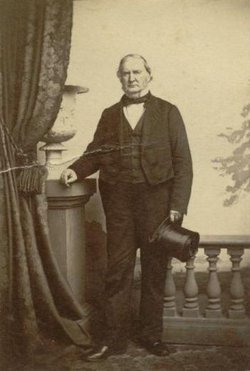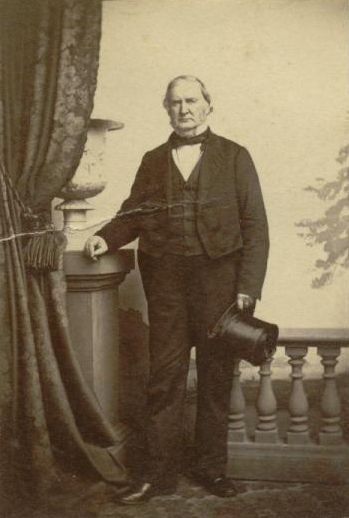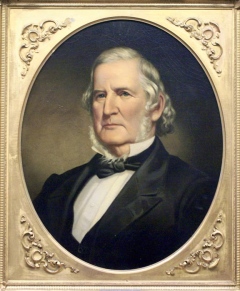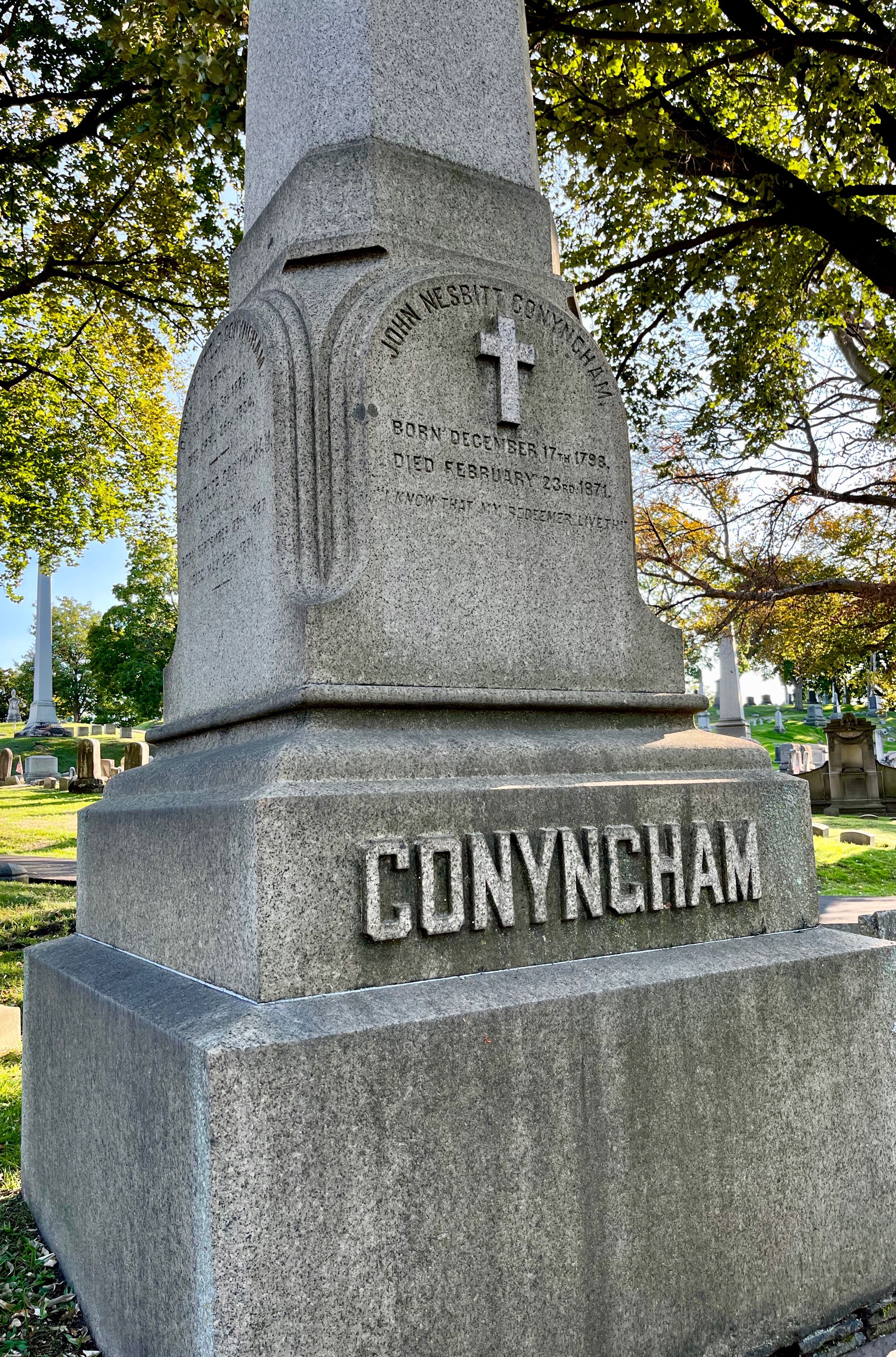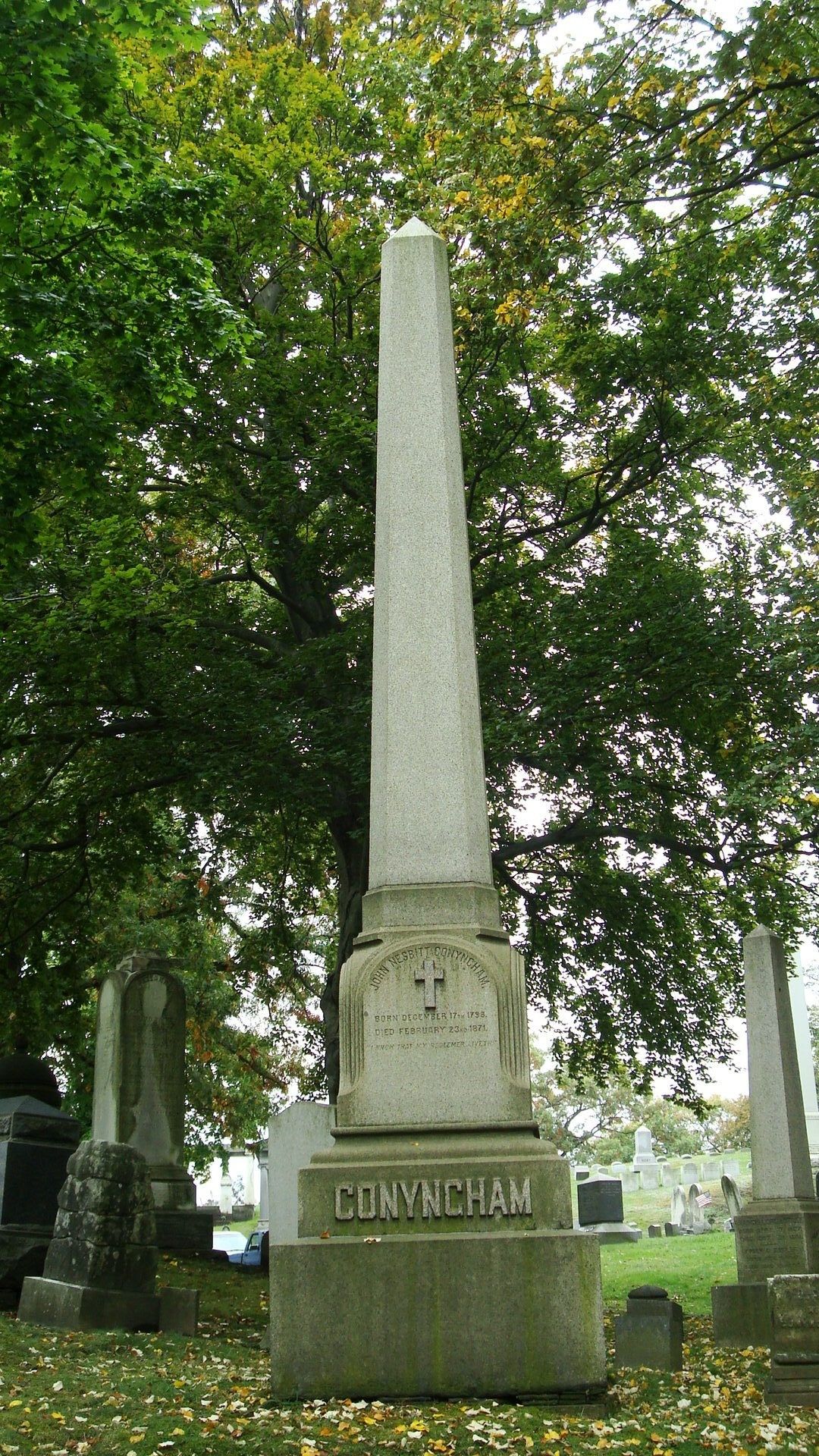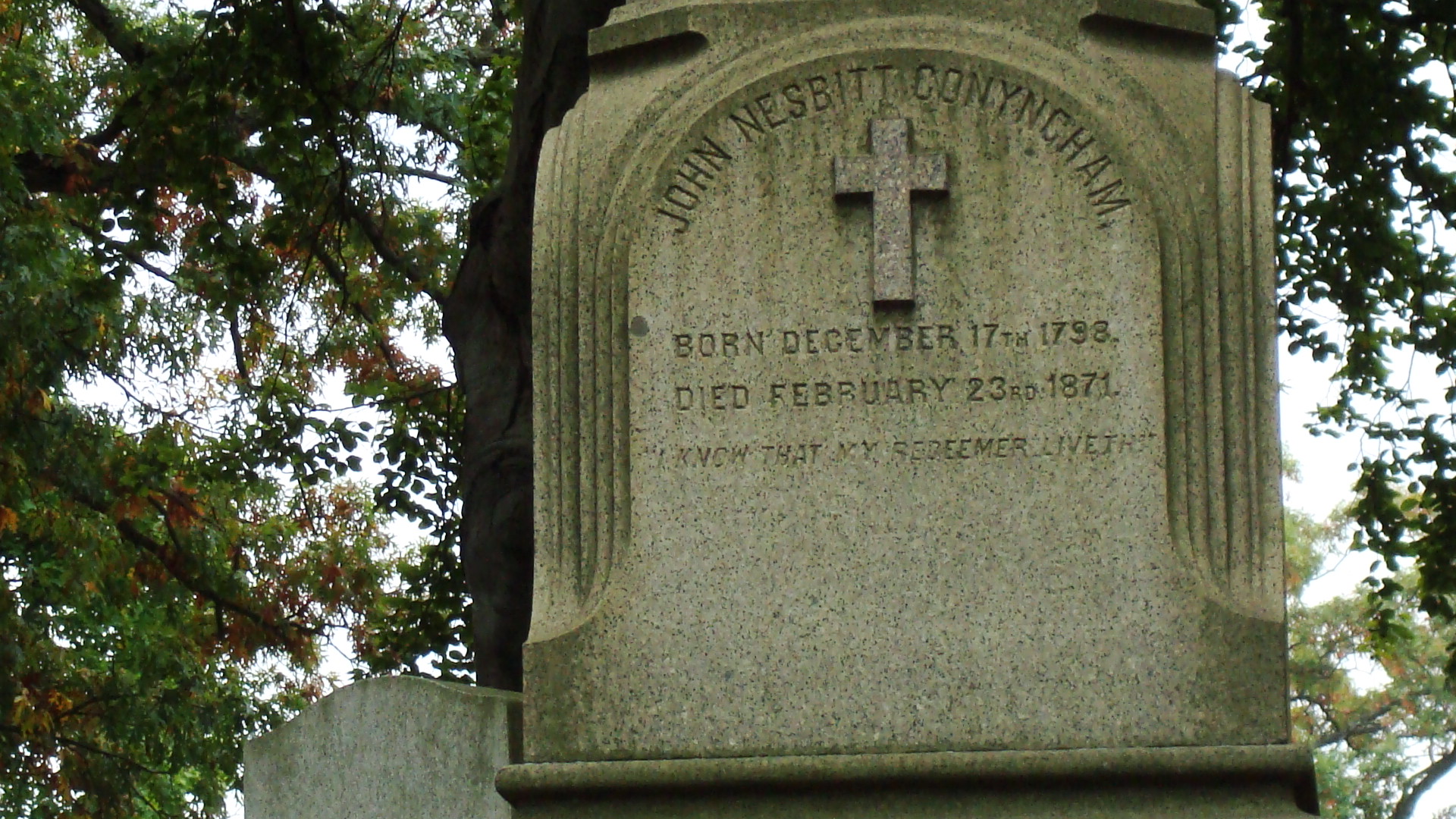History of Luzerne County Pennsylvania
H. C. Bradsby, Editor
S. B. Nelson & Co., Publishers, 1893 (out of copyright)
HON. JOHN NESBITT CONYNGHAM, LL.D., distinguished during a long and useful life in the threefold capacity of Christian, citizen, and jurist, and, for thirty years preceding his death, conspicuous as president judge, at first, of the Thirteenth Judicial District of Pennsylvania, and afterward, of the Eleventh District, was born in Philadelphia, Pa., December 17, 1798, and died (the victim of an unfortunate railroad accident) at Magnolia, Miss., about one hundred miles above New Orleans, La., February 23, 1871, in his seventy-third year. His ancestral relatives on both sides, for many generations, were people of eminence, respectability and worth. As the name indicates, the family of Conyngham is of Scotch origin. For several generations, however, the ancestors of the Judge were domiciled in Ireland, and ranked there among those who were the honor of the land, among them being numbered several distinguished divines and prelates of the Church of Ireland. His grandfather, Redmond Conyngham, a native of Ireland, was a highly respected citizen of Philadelphia. He was a prominent member of the old Christ Church of that city, and was a vestryman and warden of the Church. He was one of the founders of St. Peter's Church, of that city, and continued a member of the united parishes of Christ Church and St. Peter's until his death. His son, David Hayfield Conyngham, was the father of Judge Conyngham. He was born in the North of Ireland about 1750, and came to Philadelphia very early in life. He took an active part in military affairs, and was one of the founders of the first troops of city cavalry. As a business man he stood among the wealthiest and most prominent members of the mercantile community of Philadelphia, being a partner of the firm of J. W. Nesbitt & Co., and senior member of the house of Conyngham & Nesbitt, which, in the darkest period of the Revolution, in 1780, when Washington was apprehensive that he could not keep the field with his impoverished army, nobly came forward and supplied the needed means (some five thousand pounds) for the relief of the suffering patriots. This magnificent exhibition of patriotism and confidence was gratefully acknowledged by Washington, and also by Robert Morris, the distinguished financier of the Revolution.
The subject of this sketch received his early education under the most favorable auspices in the city of his birth. He then entered the University of Pennsylvania, and taking the full course, was graduated with high honors in 1817. Selecting the law for his profession, he entered the office of Hon. Joseph R. Ingersoll, of Philadelphia, and was admitted to the bar, in that city, February 12, 1820. The same year he located in Wilkes-Barre, where he was admitted to the bar of Luzerne county, April 3, and immediately entered upon the practice of his profession. To the careful training, fitting him for its ordinary duties, the young lawyer added great energy and superior discrimination. His practice was scientifically conducted, and success came to him slowly at first, but with increasing volume each succeeding year. After a most succesful career at the bar, covering nearly a score of years, during two of which he represented his District in the State Legislature, he was appointed in the spring of 1839, by Governor D. R. Porter, to the position of president judge of the Thirteenth Judicial District of Pennsylvania, then consisting of the counties of Susquehanna, Bradford, Tioga, Potter and McKean. The first session of his court was held at Tioga. By an Act passed April 13, 1840, Luzerne was added to his District, and Susquehanna was transferred to the Eleventh District—a proceeding which permitted Judge Conyngham to live at his home in Wilkes-Barre. His commission expired in 1849, but in the fall of 1851, under the amended constitution, he was elected to the presidency of the Eleventh district, then composed of Luzerne, Wyoming, Montour and Columbia counties. In 1853, and again in 1856, changes were made in the District, which finally consisted of Luzerne county only. In 1861 he was re-elected to office although holding political opinions differing on many points from those promulgated by the national administration. The firing on Fort Sumter aroused his patriotism, and immediately sacrificing every party feeling he addressed himself with special vigor to the preservation of the imperiled Union. His name and influence were all-powerful in his judicial district, and few men gave greater personal, or more support, than Judge Conyngham. He resigned his position on the bench in July, 1870, and on his resignation, the entire bar of Luzerne county, as one man, rose up to do him honor—the first instance of the kind in Pennsylvania. No less than sixteen judges from the Supreme Court of the United States, down through all the State judiciaries, gave in writing their deliberate judgment of his character as a judge. In 1824 he married Ruth Ann, daughter of Gen. Lord Butler, and granddaughter of that distinguished Revolutionary officer, Gen. Zebulon Butler. His family consisted of seven children, six of whom grew to maturity: Col. John Butler, U.S.A.; William Lord; Thomas; Maj. Charles Miner, U.S.A.; Mary (Mrs. Charles Parrish), and Anna, who married the Right Rev. William Bacon Stevens, of Pennsylvania.
-------------------------
"The death of Judge Conyngham occurred February 23,1871, as the result of an accident. On his way to Texas in that month to bring home his invalid son, Colonel John Butler Conyngham, he fell on the railroad at Magnolia, Mississippi, and was so severely crushed under the wheels of a passenger car that he died shortly after the accident. His last words were: "I know that my Redeemer liveth." In his honor, the name Conyngham School was given to the public institution on St. Clement's Street, Wilkes-Barre". (Oscar Jewell Harvey)
History of Luzerne County Pennsylvania
H. C. Bradsby, Editor
S. B. Nelson & Co., Publishers, 1893 (out of copyright)
HON. JOHN NESBITT CONYNGHAM, LL.D., distinguished during a long and useful life in the threefold capacity of Christian, citizen, and jurist, and, for thirty years preceding his death, conspicuous as president judge, at first, of the Thirteenth Judicial District of Pennsylvania, and afterward, of the Eleventh District, was born in Philadelphia, Pa., December 17, 1798, and died (the victim of an unfortunate railroad accident) at Magnolia, Miss., about one hundred miles above New Orleans, La., February 23, 1871, in his seventy-third year. His ancestral relatives on both sides, for many generations, were people of eminence, respectability and worth. As the name indicates, the family of Conyngham is of Scotch origin. For several generations, however, the ancestors of the Judge were domiciled in Ireland, and ranked there among those who were the honor of the land, among them being numbered several distinguished divines and prelates of the Church of Ireland. His grandfather, Redmond Conyngham, a native of Ireland, was a highly respected citizen of Philadelphia. He was a prominent member of the old Christ Church of that city, and was a vestryman and warden of the Church. He was one of the founders of St. Peter's Church, of that city, and continued a member of the united parishes of Christ Church and St. Peter's until his death. His son, David Hayfield Conyngham, was the father of Judge Conyngham. He was born in the North of Ireland about 1750, and came to Philadelphia very early in life. He took an active part in military affairs, and was one of the founders of the first troops of city cavalry. As a business man he stood among the wealthiest and most prominent members of the mercantile community of Philadelphia, being a partner of the firm of J. W. Nesbitt & Co., and senior member of the house of Conyngham & Nesbitt, which, in the darkest period of the Revolution, in 1780, when Washington was apprehensive that he could not keep the field with his impoverished army, nobly came forward and supplied the needed means (some five thousand pounds) for the relief of the suffering patriots. This magnificent exhibition of patriotism and confidence was gratefully acknowledged by Washington, and also by Robert Morris, the distinguished financier of the Revolution.
The subject of this sketch received his early education under the most favorable auspices in the city of his birth. He then entered the University of Pennsylvania, and taking the full course, was graduated with high honors in 1817. Selecting the law for his profession, he entered the office of Hon. Joseph R. Ingersoll, of Philadelphia, and was admitted to the bar, in that city, February 12, 1820. The same year he located in Wilkes-Barre, where he was admitted to the bar of Luzerne county, April 3, and immediately entered upon the practice of his profession. To the careful training, fitting him for its ordinary duties, the young lawyer added great energy and superior discrimination. His practice was scientifically conducted, and success came to him slowly at first, but with increasing volume each succeeding year. After a most succesful career at the bar, covering nearly a score of years, during two of which he represented his District in the State Legislature, he was appointed in the spring of 1839, by Governor D. R. Porter, to the position of president judge of the Thirteenth Judicial District of Pennsylvania, then consisting of the counties of Susquehanna, Bradford, Tioga, Potter and McKean. The first session of his court was held at Tioga. By an Act passed April 13, 1840, Luzerne was added to his District, and Susquehanna was transferred to the Eleventh District—a proceeding which permitted Judge Conyngham to live at his home in Wilkes-Barre. His commission expired in 1849, but in the fall of 1851, under the amended constitution, he was elected to the presidency of the Eleventh district, then composed of Luzerne, Wyoming, Montour and Columbia counties. In 1853, and again in 1856, changes were made in the District, which finally consisted of Luzerne county only. In 1861 he was re-elected to office although holding political opinions differing on many points from those promulgated by the national administration. The firing on Fort Sumter aroused his patriotism, and immediately sacrificing every party feeling he addressed himself with special vigor to the preservation of the imperiled Union. His name and influence were all-powerful in his judicial district, and few men gave greater personal, or more support, than Judge Conyngham. He resigned his position on the bench in July, 1870, and on his resignation, the entire bar of Luzerne county, as one man, rose up to do him honor—the first instance of the kind in Pennsylvania. No less than sixteen judges from the Supreme Court of the United States, down through all the State judiciaries, gave in writing their deliberate judgment of his character as a judge. In 1824 he married Ruth Ann, daughter of Gen. Lord Butler, and granddaughter of that distinguished Revolutionary officer, Gen. Zebulon Butler. His family consisted of seven children, six of whom grew to maturity: Col. John Butler, U.S.A.; William Lord; Thomas; Maj. Charles Miner, U.S.A.; Mary (Mrs. Charles Parrish), and Anna, who married the Right Rev. William Bacon Stevens, of Pennsylvania.
-------------------------
"The death of Judge Conyngham occurred February 23,1871, as the result of an accident. On his way to Texas in that month to bring home his invalid son, Colonel John Butler Conyngham, he fell on the railroad at Magnolia, Mississippi, and was so severely crushed under the wheels of a passenger car that he died shortly after the accident. His last words were: "I know that my Redeemer liveth." In his honor, the name Conyngham School was given to the public institution on St. Clement's Street, Wilkes-Barre". (Oscar Jewell Harvey)
Family Members
Advertisement
Advertisement
